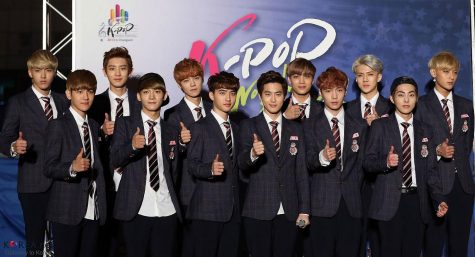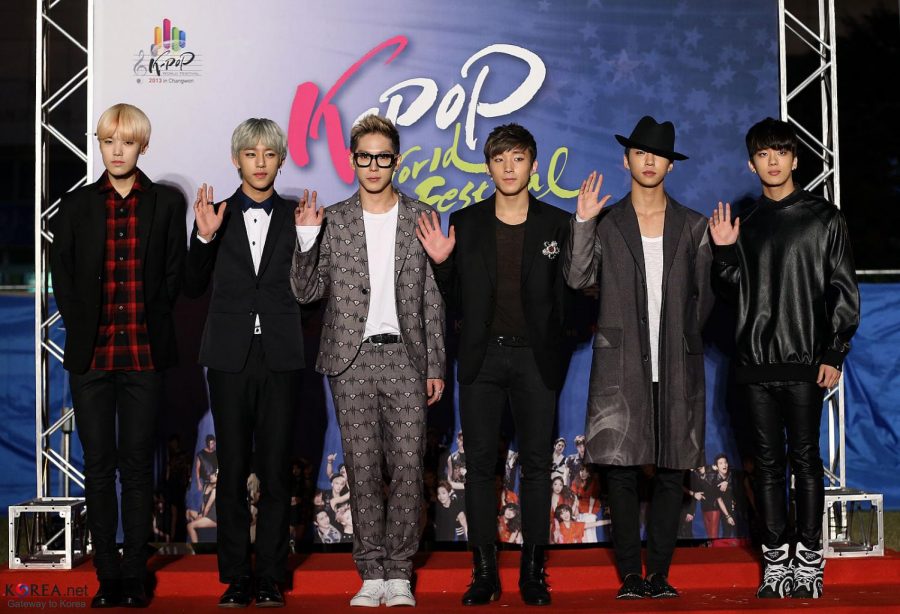The Ins and Outs of the Korean Entertainment Industry
B.A.P. at K-POP World Festival in Changwon, South Korea, 201
October 10, 2018
Sparkling outfits, charismatic personalities and uncontrollably catchy pop songs are a picture-perfect world for a rising K-pop star hoping to make it big in the Korean music industry. But even underneath this charming, bubbly genre, lies an ugly reality.
The K-Pop industry began gaining speed in 2012 when Psy’s Gangnam Style was the most viewed YouTube clip of the year. The combination of Asian and Western music styles became known around the world as what we now call today, K-pop.
As K-Pop gained popularity, stories of sexual harassment, overly obsessive fans and a trend with plastic surgery slowly uncovered the dark side of the genre.
In an interview between Author Roald Maliangkaij of K-pop — The International Rise of the Korean Music Industry and news.com.au, Maliangkaij says, “The fashion, the hair, the clothes, the style — these things are not always attainable. Probably 95 percent of performers have had surgery. It’s mainly the face: the jawline, noses, eyelids, lips … It can be a significant difference. You do see fans copying, and there are cases where it goes wrong, causing disfigurement.”
“I don’t believe that K-pop is an accurate representation of Korean culture. K-pop idols tend to wear a lot of makeup. How they behave and respond to things in public tend to be filtered to make sure they don’t bring a bad name onto themselves and their group,” Korean club president, Cheyenne Johnson said.
Before anyone can become a K-pop idol, one must endure rigorous training. Even after someone passes the auditions and becomes a trainee, they are one of hundreds competing for a limited few spots to make their debut. Trainees take part in singing, dancing, acting and language classes throughout their day, starting as early as 5 a.m. and ending at 1 a.m. the next day. Jessica Chua writes on Rojak Daily that companies hold monthly evaluations where trainees’ are evaluated at the end of the month.
If a trainee is able to make it through the training process and make their debut, there are more rules put in place that follow. Following a strict diet is required in most all K-pop stars along with heavy exercise.
Besides practicing, idols have to market their work which creates an even busier schedule for the stars. Between commercials, photo shoots, variety shows and special events, idols are packed to the brim. Chua notes that there have been multiple cases of idols fainting on stage and having to be rushed to the hospital.
The Korean entertainment industry has also become well known for their specific type of contract between company and client. Some contracts can last up to 10 years, denying clients basic necessities such as sick days. Rojak Daily notes that soon after the Korean Free Trade Commission introduced standardized contracts, companies were limited to binding clients up to a maximum of seven years.
The pressure to appear flawless and have a picture perfect image has not only consumed the pop stars, but fans as well. Thousands of fans have begun traveling to South Korea’s capital, Seoul, for cosmetic surgery so they too can look like their favorite pop stars. Even tourist from western countries like Australia and New Zealand have taken interest in these cosmetic surgery procedures since they too want to look like their icons.
Maliangkaij adds that the country of South Korea has a large sex industry. In multiple cases, there have been female K-pop stars being forced to quit music after being sexually harassed.
Although K-pop stars have incredible expectations from their management, fans are often the ones setting unattainable standards. The stars are not only expected to maintain a flawless physical appearance, but are also expected to behave like exemplary citizens. Maliangkaij states that all of the main stars publicly support a charity. In doing this, fans attempt to follow in their idols footsteps by donating their own time and money to those charities.
Due to the fact that the fans set the expectations for their idols, when stars fall short of those expectations, a star may face retaliation. Supporters may be enraged by inadequate performances, lack of attention or the members not getting along. A star never wants to be on bad terms with his or her fans because they are in control of the outcome of the stars career.
Similar to a stalker, invasive and sometimes obsessive fans of K-pop idols are known as Sasaeng fans. An article by SBS PopAsia HQ noted that these fans have been known to try and kidnap stars, trespass on their property, write love letters to them in blood and even cause car crashes. Than, just two months later, SBS.com.au egged teen fans on in their article “9 Steps to Becoming a True K-pop Fan.” Step three was to find a bias wrecker which is someone who makes you rethink who your bias or favorite star actually is.
Fans obsessive behavior has not only been encouraged by businesses, but some companies have figured out ways to profit off of their mania. Some Korean taxi companies now offer services where they will chase down idols for Sasaeng fans, speeding up to 120 mph, causing accidents.
As K-pop’s popularity in America continues to increase, it’s possible that some of the harmonies and melodic complexity might trickle back into the U.S. mainstream. America created R&B music infused with hip-hop back in the 1990s, and K-pop is a reintroduction to that similar genre.
“Hopefully it allows more K-pop artists, but also more American artists that love R&B, to do R&B,” Kelly adds. “And make a lot of money doing it,” songwriter Claude Kelly said in an interview with Rolling Stone.
The recent popularity in K-pop has sparked a fascination in Korean culture, but Cheyenne Johnson notes that no one can expect to go to Korea and expect every Korean to be able to sing, dance and model.
“They’re a society just like we are, with thoughts and their own history. Comparing Koreans to K-pop stars is like expecting every single American to be like the backstreet boys,” Johnson said.

EXO at K-POP World Festival in Changwon, South Korea, 2013.


















